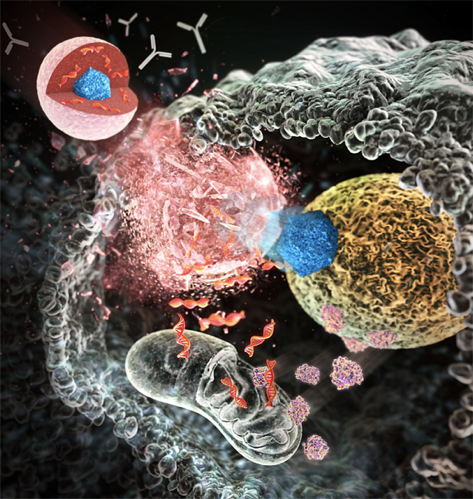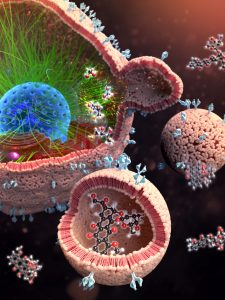Specific, Multimodal Hybrid Gene Carriers

Gene therapy provides opportunities to directly treat cancer and other diseases at a molecular level, however effective delivery of nucleic acids has proven to be the biggest hurdle to success in this field. Viruses are effective delivery vehicles but have many safety and immunogenicity concerns. While nonviral vectors are safer and easily modifiable, they are inefficient at genome integration. Hybrid viral/nonviral gene carriers can be modified to take advantage of the efficient delivery of viruses, while increasing biocompatibility. Through capturing the AAV in an acid-degradable shell, you can increase the delivery while decreasing immunogenicity. This shell will degrade in the acidic endosome, releasing it’s cargo and increasing endosomal release. The shell can be further modified to incorporate RNA, leading to a multi-modal, synergistic therapy, targeting specific mutated pathways at multiple points.
Engineered Extracellular Vesicles for Comprehensive Molecular Therapy

Health care today is in crisis as it is expensive, toxic, and inefficient. Additionally, many commonly prescribed drugs are not effective for large portions of the patient population. With these outstanding issues, the clinical method of “one size fits all” is coming to an end with the increasing demand for a comprehensive approach.
This research focuses is on the development of bioactive therapies using extracellular vesicles (EVs). EVs are derived from the cell of interest, already presenting active molecules required for drug delivery and with the ability to avoid rapid clearance. EVs can then be customized by loading with cargo or drugs for delivery to the patient’s diseased tissue, or, in some cases, surface modification could be completed to achieve improved targeting. Finally, EVs are highly translatable to applications in many diseases, as their cargo and surface molecules can be modified accordingly. We are investigating the engineering of EVs for multiple treatments.
Nanoantibiotics

Recently, there have been increasing calls for novel antimicrobials to combat the rise of drug-resistant bacteria. The conventional method of creating new antibiotics relies heavily on the discovery of an antimicrobial compound from another microbe. This paradigm of development is flawed since microbes can easily transfer a resistant mechanism if faced with an environmental pressure. Nanoantibiotics, (nAbts), provide a new way to circumvent the current paradigm of antimicrobial discovery and present a novel mechanism of attack not found in microbes yet; which may lead to a longer-term solution against drug-resistance formation. This allows for environment-specific activation and efficacy of the nAbts but may also open and create new design methods for various applications. These nAbts provide promise, but there is still ample work to be done in their development
